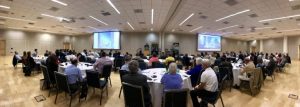Written by Christina Batcheler
 Technology experts, policy makers, health care providers, architects, senior living community leaders, and educators gathered at George Mason University’s Founders Hall in Arlington for the Assistive Technology to Smart Homes and Senior Housing Design Conference. The conference featured ways the technology, real estate, and innovation communities can come together and collaborate to help develop transformational assistive technology products, services, and communities. The event was hosted by George Mason University‘s School of Business (Research Partnerships and Center for Real Estate Entrepreneurship) and NoVaRHIO.
Technology experts, policy makers, health care providers, architects, senior living community leaders, and educators gathered at George Mason University’s Founders Hall in Arlington for the Assistive Technology to Smart Homes and Senior Housing Design Conference. The conference featured ways the technology, real estate, and innovation communities can come together and collaborate to help develop transformational assistive technology products, services, and communities. The event was hosted by George Mason University‘s School of Business (Research Partnerships and Center for Real Estate Entrepreneurship) and NoVaRHIO.
“We were pleased to collaborate on this conference as one of the topics of interest to the Center for Real Estate is the need for innovation in the design, development and construction of livable and accessible places for aging populations,” said Eric Maribojoc, Executive Director, Center for Real Estate Entrepreneurship, School of Business, George Mason University. “This will require an inter-disciplinary and multi-industry approach. It was good to see professionals from healthcare, public agencies, education, design, and real estate come together to address these topics,” he added.
 The morning conference featured a full line-up of prestigious experts in their fields, including Teresa Booher, Office of CIO, National Institutes of Health, Stephen King, Director of Office of Accessibility & Accommodations, U.S. Department of State, Chris Gordon, Principal, KGD Architects, John Scott, President and CEO, Scott-Long Construction and Matt Fowler, Director of Preconstruction, Scott-Long Construction, Steve Ruiz, Vice President, Moseley Architects, Gail Kutner, Arlington Commission on Aging, Robert Jarrin, Senior Director of Government Affairs, Qualcomm, Paul Schroeder, Director of Public Policy & Strategic Alliances, Aira, and Anthony Nunez, Founder & CEO, INF Robotics.
The morning conference featured a full line-up of prestigious experts in their fields, including Teresa Booher, Office of CIO, National Institutes of Health, Stephen King, Director of Office of Accessibility & Accommodations, U.S. Department of State, Chris Gordon, Principal, KGD Architects, John Scott, President and CEO, Scott-Long Construction and Matt Fowler, Director of Preconstruction, Scott-Long Construction, Steve Ruiz, Vice President, Moseley Architects, Gail Kutner, Arlington Commission on Aging, Robert Jarrin, Senior Director of Government Affairs, Qualcomm, Paul Schroeder, Director of Public Policy & Strategic Alliances, Aira, and Anthony Nunez, Founder & CEO, INF Robotics.
“The conference illuminated the unprecedented opportunities that technology has created for assistive solutions and senior smart homes and communities,” said J.P. Auffret, Ph.D. Director, Research Partnerships and Grants Initiative, School of Business; and Associate Director, Center for Assurance Research and Engineering, School of Engineering at Mason. “Many people walked away very excited about the new insights from case studies by experts experienced in developing and marketing products for people with disabilities,” he added.
Attendees learned about assistive technologies in the areas of sensing, cognitive and mobility and applicable for the visually and hearing impaired and aging populations; and about real estate and architecture innovation for senior communities and aging in place. Current approaches to community design and recent technology and architectural innovations bridging design and technology were also featured.
To view some of the presentations, please go to: http://business.gmu.edu/realestate/research/conference-and-panel-presentations/.
We are planning for a spring follow-on Assistive Technology, Smart Homes and Senior Housing Design conference – please let us know current topics you are interested in or suggestions and volunteers for speakers. In addition, if you are working on assistive technologies, smart homes and senior housing design and are interested in partnering on a research to practice initiative we would appreciate hearing from you. Please contact us at J.P. Auffret at [email protected].
